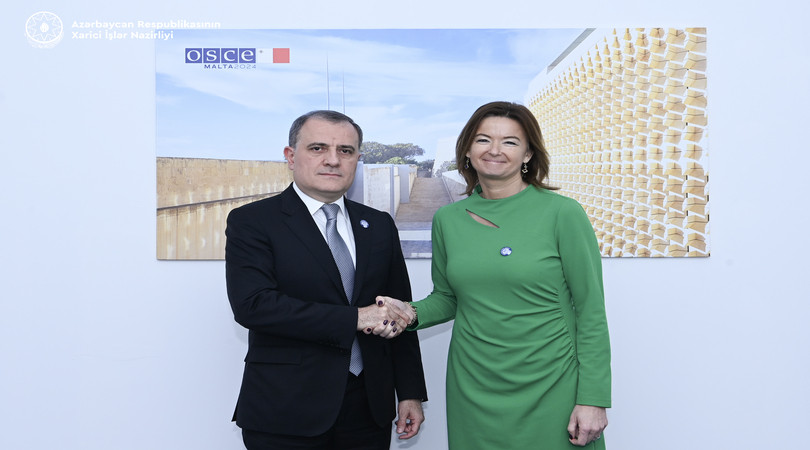Statement by H.E. Mr. Jeyhun Bayramov, Minister of Foreign Affairs of the Republic of Azerbaijan at the 31st Meeting of the OSCE Ministerial Council
Mr. Chairperson,
Distinguished Ministers,
Ladies and Gentlemen,
At the outset, I thank H.E. Mr. Ian Borg, the OSCE Chairperson-in-Office, for hard work in chairing the organization during the year and excellent organization of the Ministerial Council. I also wish Minister Elina Valtonen of Finland a successful chairmanship next year.
The Ministerial Council meeting is being held under profoundly difficult circumstances. Violations of international law and misinterpretation and selective application of international commitments lies at the heart of erosion of trust and confidence and continued crisis of multilateralism. In the meantime, security and stability is under threat due to growing transnational challenges that know no border and dictate multilateral solutions.
Rising ethnic and religious intolerance and discrimination, such as Islamophobia and anti-Semitism in Europe is alarming. It is urgent for respective OSCE participating States to honor their relevant OSCE commitments and international obligations.
Respect and adherence to the fundamental norms, principles and commitments enshrined in the OSCE documents, starting from the Helsinki Final Act, in particular respect for the sovereignty, territorial integrity and inviolability of borders of States must remain the bedrock of security and peace, as well as the basis for dialogue and cooperation.
Azerbaijan remains a strong proponent of effective multilateralism, including through the OSCE and calls for constructive engagement in finding settlement to issues pertinent to OSCE’s functionality, such as the earliest adoption of the budget and settlement of the deadlock around the issue of appointment of the Secretary General and heads of executive structures.
In full compliance with OSCE Financial Regulations, the Organization’s scarce resources must be allocated where they are needed the most, to fund the programmatic activities that are relevant and around which there is consensus.
OSCE structures related to the former Minsk process have become obsolete and irrelevant. Retaining these structures on paper violates financial regulations of the Organization. Accordingly, this situation needs to be rectified within the budget process.
Distinguished Ministers,
While OSCE is held hostage to malicious ambitions, significant strides have been taken on the ground in the Armenia-Azerbaijan context. Finally, peace has essentially been established with elimination of illegal military deployment and restoration of Azerbaijan’s sovereignty and territorial integrity. This has created substantially new conditions to pave the way for inter-state normalization.
Since the last Ministerial Council meeting, Azerbaijan and Armenia completed delimitation and demarcation of some portion of their borders through direct bilateral dialogue. With its recent entry into force, the Regulation regarding the joint activities of the respective border commissions will guide efforts to carry out the next phases of the delimitation work. On a separate track, significant progress was also registered with respect to the text of the draft bilateral agreement.
These achievements vividly demonstrate that direct bilateral negotiations are the best and the only viable way for moving forward in the normalization process, which has been consistently advocated for by Azerbaijan.
Notwithstanding the progress, there are persistent challenges on the path of normalization. Its finalization depends on implementing in action Armenia’s declared commitment to respect the territorial integrity and sovereignty of Azerbaijan, including by removing territorial claims still embedded in its Constitution and other legislative acts.
Establishment of peace and good-neighborly relations cannot be sustainable and irreversible if recognition of sovereignty and territorial integrity of Azerbaijan continues to be questioned in Armenia’s Constitution, and implementation of the bilateral agreement by Armenia remains contingent on domestic legal or political scenarios.
At this critical juncture when there is a historic opportunity for Azerbaijan and Armenia to turn the page of confrontation and establish good-neighborly relations, all efforts must be directed at finalizing the normalization process on the basis of mutual respect for the sovereignty and territorial integrity.
Azerbaijan’s determination in this respect is intact and we expect reciprocal political will and responsibility on part of Armenia.
In the meantime, the wider international community also bears responsibility not to harm the ongoing process by refraining from provocative actions and fuelling tension, including here in the OSCE.
Distinguished Colleagues,
Before concluding, I reiterate the readiness of Azerbaijan for constructive engagement within the OSCE in overcoming the existing challenges to its functionality and efficiency.
Thank you.

.jpg)

.jpg)
.jpeg)














